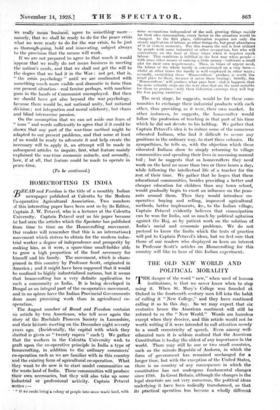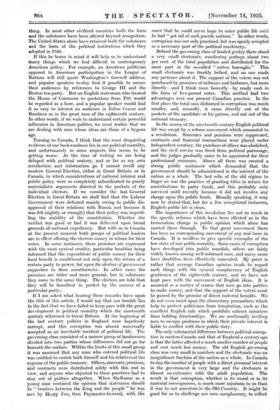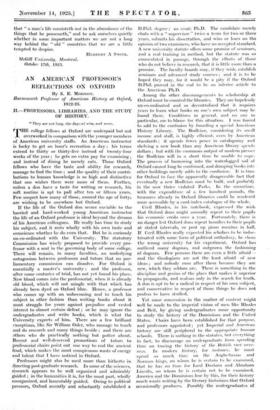THE OLD NEW WORLD AND • POLITICAL MORALITY rr HE danger
of the word "new," when used of human institutions, is that we never know when to stop using it. When St. Mary's College was founded at Oxford in the fourteenth century men fell into the habit of calling it "New College," and they have continued calling it so to this day. So we may expect that six centuries hence the American continent will still be referred to as the, "New World." Words are harmless except when they deceive, and this article would not be worth writing if it were intended to call attention merely to' it small eccentricity of speech. Even among well- educated men it is seldom realized that the American Constitution is to-day the oldest of any importance in the world. There may still be one or two small countries, such as the minute Republic of Andorra, in which the form of government has remained unchanged for a longer thne, but with the exception of the United States, there is no country of any consequence in which the constitution has not undergone fundamental changes since 1789. In Great Britain, although the changes in the legal stritatrie arc not very nunierou.si the political ideas underlying it have been radically transformed, so that its pfictical operation has become a wholly different thing. In most other civilized countries both the form and the substance have been altered beyond recognition. The United States alone have retained both the substance and the form of the political institutions which they adopted in 1789.
If this be borne in mind it will help us to understand Many things which we find difficult in contemporary American" policy. For example, an American politician opposed to American participation in the League of Nations will still quote Washington's farewell address, and popular speakers to-day find it possible to arouse their audiences by references to George III and the Boston tea-party. But an English statesman who treated _the -House of Commons to quotations from Pitt would be regarded as a bore, and 'a popular speaker would find it as easy to interest an audience in Julius Ceasar and Boadicea as in the great men of the eighteenth century. In other words, if we wish to understand certain powerful influenc,es in American politics, we must realize that we are dealing with men whose ideas are those of a bygone age.
Turning to Canada, I think that the most disquieting evidence of our backwardness lies in our political morality, and nnfortunately in some respects this seems to be getting worse. At the time of writing we are being deluged with political oratory, and so far as my own recollection and information go I cannot recall any modern • General Election, either in Great Britain or in Canada, in which considerations of national interest and public policy were so completely subordinated to purely materialistic arguments directed to the pockets of the individual electors. If we consider the last General Election in Great Britain we shall find that the Labour Government were defeated mainly owing to public dis- approval of their relations with Russia and because it was felt (rightly or wrongly) that their policy was imperil- ling the stability of the constitution. Whether the verdict was good or bad it was delivered upon broad grounds of national expediency. But with us in Canada at the present moment both groups of political leaders are in effect offering the electors money in return for their votes. In some instances, these promises are expressed with the most cynical crudity, particular localities being informed that the expenditure of public money, for their local benefit is conditional not only upon the return of a certain party to power, but upon the election of government supporters in those constituencies. In other cases the promises are wider and more general, but in substance they come to the same thing. The electors are told that they will be benefited in pocket by the success of a particular party.., If I am asked what bearing these remarks have upon the title of this article, I would say that our trouble lies in the fact that we have failed to keep pace with the great development in political morality which the nineteenth century witnessed in Great Britain. At the beginning of the last century politics in England were hopelessly corrupt, and this corruption was almost universally accepted as an inevitable incident of political life. The governing class consisted of a narrow group of landowners divided into two parties whose differences did' not go far beneath the surface. Within the limits of this small group it was assumed that any man who entered political life was entitled to enrich both himself and his relatives at the expense of the public treasury. Offices, sinecures, pensions, and contracts were distributed solely with this end in view, and anyone who objected to these practices` had to stay out of politics altogether., When Shelburne as a• young man ventured the opinion that statesmen should be "trustees between the King and the people" he was met by ileury Fox, then Paymaster-General, With tge sneer that he could never hope to -enter public life until he had "'got rid of such puerile notions." " In Other Words, corruption was not only practised; but was openly accepted as a necessary part of the political *machinery.
Behind the governing class of landed gentry there stood a very small electorate, numbering perhaps about two per cent, of the total population "and distributed *for the most part in the so-called "rotten boroughs." This small electorate was frankly bribed, and no one made any pretence about it. The § upport of the voters was not purchased by promises of railways and harbours, but more directly—and -1 think more honestly—by ready cash in the form of five-pound notes. This method bad two advantages over our present Canadian practice. In the first place the total sum disbursed in corruption was much smaller, and, secondly, it came directly out of the pockets of 'the candidate Or his patron, and not out of the national treasury. "
In the -course of the nineteenth century English political life was swept by a reform. movement which amounted to a revolution. . Sinecures and pensions were suppressed, contracts and financial transactions were placed under independent SCrutiny, the purchase Of Offices was abolished, and the civil service was freed from political patronage, and the judges gradually came . to be appointed for their professional. eminence. Above all there was created 'a strong public Sentiment which demanded that the government should be administered in the interest of the nation as a whole. The last relic" of the Old .regime to linger on was the practice of 'granting titles in return for contributions to party funds, and this probably only survived until recently because it did not involve any charge upon the public funds. Broadly speaking, it may now be stated that; but for 'a" few. "exceptional' instances, English public life. is clean. . " The importance of this revolution lies not in Much in the specific reforms which have been effected as in the tremendous change in public opinion . which alone has carried them through. To that great moVeMent there has been no corresponding movement of any real force in Canada. It is needless to give specific eXam"Ples of the low state of our public morality. Some eases Of corruption have developed into public scandals, Others– are fairly widely known among. well men, and Many more have doubtless been effectively concealed.' My point is rather that average Canadian opinion. tends to regard such .,things with the cynical complacency of English gentlemen of the eighteenth century, and we have not kept pace with the movement of English ideas.- is assumed as matter of course. that men go into:). "olitics to make money, and that the support of the voters must be gained by the promise Of direct material benefits. We _ . .
do not even insist upon the elementary precautions which help to protect politicians from teMptation, such as the _ excellent English rule which prohibits cabinet ministers from holding directorshipS.. We are continually inviting - . men to occupy positions in which their private interest is liable to conflict with, their public duty. "
The only' Substantial difference between political corrup- tion in modern Canada and that of England .a century ago is that the latter affected a much smaller numher of people and cost . much less .Money. The old English _governing class Was very small in numbers and the electorate was an insignificant fraction of the nation as a WhOle... Caliada to-day the number" of people with "a direct personal interest in the . government is very large and the .electorate is almost co extensive with the adult poliulatton.._ The result" is that . corruption, whether in its Moral or, in its . . material consequences, is much. more injUriOUs. to us than it WO to Our ancestors in the Old Country. it might be • . . . good far us to challenge our own complacency, to reflect that "a man's life consisteth not in the abundance of the things that he possesseth," and to ask ourselves quietly Whether in some important matters we are not a long way behind the " old " countries that we are a little tempted to despise.
icGill University, Montreal. October 17th, 1925. HERBERT A SMITEI.




























































 Previous page
Previous page